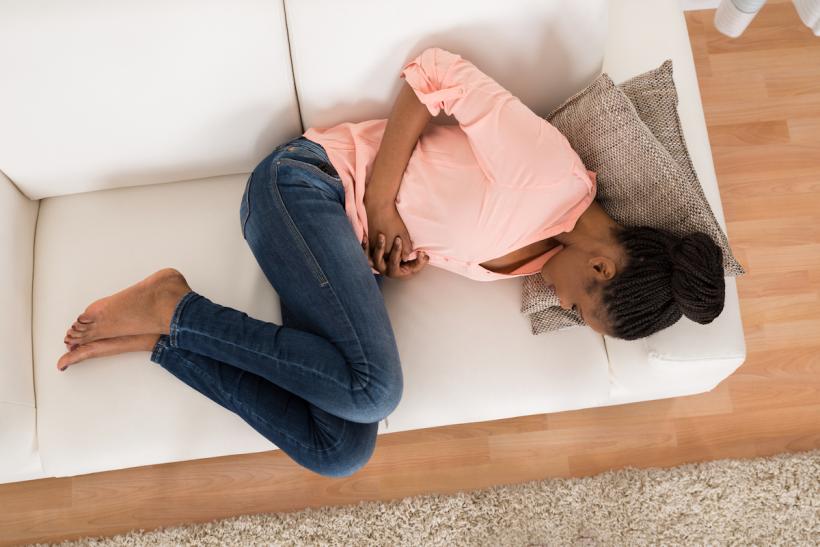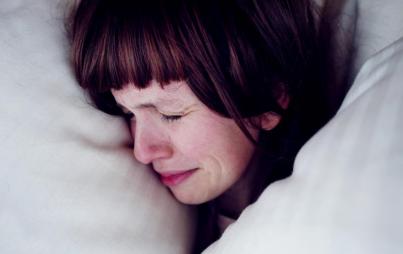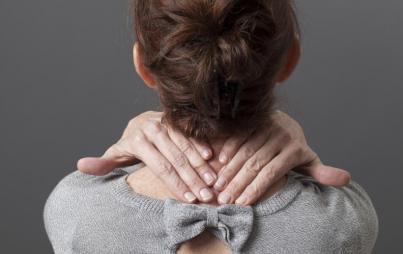
When we use terms like ‘bad cramps,’ we normalize (and devalue) the experience of female-centric pain.
On my best days I believe everyone’s pain is valid. I don’t subscribe to a hierarchy of anguish, and I try to make room for all the various experiences we face as humans. For two weeks out of my menstrual cycle, however, I suspend this belief. From day 22 onward, when I can no longer eat, the left side of my body radiates with nerve pain, and I can only move between my bedroom and the base of my toilet ( where I vomit), I believe some pain is worse than others.
On those days, I don’t believe all cramps are created equally, so today I come out of hiding with a simple request: please stop saying you have bad cramps.
Even if you have menstrual-related pain far worse than mine, let’s all place a moratorium on the term.
I get it; painful periods are pervasive. According to the Association of American Family Physicians, the number of people who report period pain so intense that it interrupts their lives varies anywhere from 16-90%. Primary dysmenorrhea, the catch-all term for people who experience painful cramps, is a diagnosis that doesn’t necessarily point to any discernable treatment. Many of us, as a result, are stuck with intense pain and no course of action.
In the piece, “Period pain can be ‘almost as bad as a heart attack.’ Why aren’t we researching how to treat it?,” Olivia Goldhill writes, “There are two main causes of period pain: Primary dysmenorrhea and endometriosis. The former is simply painful periods, with no certain medical explanation, that tends to affect women as soon as they start menstruation. But the distinction between the two conditions is not clear-cut, as many women suffering dysmenorrhea may have undiagnosed endometriosis.”
True solidarity isn’t fostered through comparison. Meaningful support comes when we give up the need to locate ourselves in the experience of another’s pain.
I have endometriosis; though the only way to be diagnosed is to have laparoscopic surgery.
My gynecologist, a kind woman who calls her patients personally to discuss test results, is the only doctor in a ten year journey to use this term. My decade-long adventure involved being passed from primary care doctor to a gastroenterologist, a nutritionist, and back to several more gynecologists, who all tried to force-feed me birth control (despite my concerns about the link between birth control and depression). Except for my GI doctor, who told me to buy Metamucil and exercise more, every medical professional suggested either birth control or Tylenol.
When my current gynecologist finally touched my stomach, looked me in the eyes and told me I probably had endometriosis, a disorder that occurs when endometrial-like cells that grow in your uterus decides to grow elsewhere in the body, I felt relief.
“We won’t know for sure unless we do laparoscopic surgery,” she cautioned. “And even if we do that, the endometrial tissue might grow back.”
Though my gynecologist also tried to prescribe me birth control, her willingness to name my ‘bad cramps’ opened me up to explore my own course of action. Suddenly, I wasn’t vacillating between IBS and PMS (there’s a connection between the two). I had something I could research. I found books. I found Lena Dunham and Padma Lakshmi. I found communities of non-famous people who were also fighting the endometriosis fight. Everything I found made me realize, while endometriosis had been kicking my butt for a decade, the term ‘bad cramps’ was effectively breaking my spirit.
Prior to my diagnosis, friends would throw around the term ‘bad cramps.’ They all knew someone who had ‘bad cramps’ like me, or they had ‘bad cramps’ themselves. While I was writhing in pain so deep I’d pass out in a puddle of tears, they’d suggest a warm compress or putting my legs against the wall. My well-meaning friends would share how their ‘bad cramps’ were cured with birth control or yoga, and I’d feel like the failure with a low tolerance for pain. I’d sit in bed, between pain spells and wonder if my agony was an elaborate form of laziness designed to help me shirk the adulthood.
The Bad Cramps Brigade meant to foster solidarity, was inadvertently gas-lighting me.
Aubree Deimler, a health coach and author of From Pain to Peace with Endo: Lessons learned on the road to Healing Endometriosis, explained, “…there is a stigma, in general, with menstruation, and because of that ‘bad cramps’ can be taken less seriously. Endometriosis is much more than bad cramps...[it] differs from other reproductive disorders because it doesn’t only impact the reproductive space. It’s systemic and needs to be treated that way.”
Deimler, who also runs an active Facebook community for endometriosis sufferers, reminds me that medicine is tinged with instances of female suppression. She tells me the term hysterectomy, for instance, comes from the term ‘hysteria.’
Her reminder drives home the point that language is an agent of oppression.
When we use terms like ‘bad cramps,’ we normalize (and devalue) the experience of female-centric pain. This contributes to an already pervasive culture that overlooks the need for scientific research, effective treatments and potential cures. We can draw a straight line from our use of ‘bad cramps’ to the doctors who find it difficult to obtain grants for reproductive disorders.
Olivia Goldhill, in her Quartz essay, spends a good deal of time interviewing doctors and exploring the lack of funding for period pain research. She ends her piece with the following statement, “So if your period causes pain, don’t grimace and bear it: Tell your doctor, your friends, your colleagues. We need to talk about period pain long and loudly enough for doctors to finally do something about it.”
Goldhill is right, I decide. We should be talking to each other more, so, at the end of my interview with Deimler, I asked her if she has any pet-peevs that come from sharing her diagnosis with others.
“Along with endo, and likely because of it,” Deimler shares, “I struggle with infertility. People’s response to that is what irks me more. When I tell other ladies, that have kids and do not have endo, that I have fertility issues, more often than not their first response is, ‘you could just adopt.’ This response skips over the acknowledgement that infertility is painful and not easily ‘fixed’ via adoption. Adoption is not for everyone and it’s expensive.”
In light of Deimler’s experience, my tirade against ‘bad cramps’ seems almost trivial, and that’s okay. True solidarity isn’t fostered through comparison. Meaningful support comes when we give up the need to locate ourselves in the experience of another’s pain. We can be present for each other without inserting ourselves into the narrative, and perhaps, in that space of real compassion, we’ll find the right words to express real solidarity.








